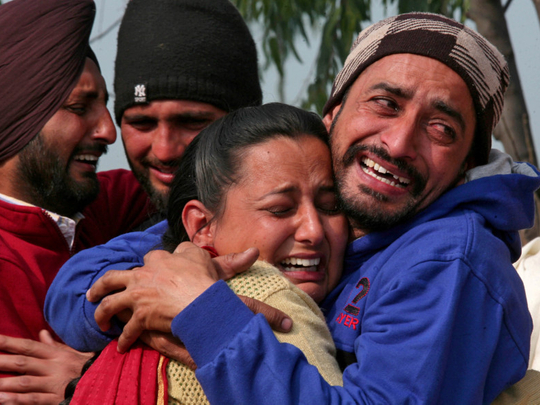
Thursday’s tragic terrorist attack targeting a convoy carrying paramilitary soldiers in Indian-administered Kashmir has unleashed yet another round of unfortunate friction between India and Pakistan.
India on Friday threatened to diplomatically isolate Pakistan in addition to withdrawing trade concessions to its neighbour, awarded more than two decades ago. Though the impact of these steps will be largely symbolic, they point towards a dangerous trend.
In the heat of the moment and viewed within the background of the history of India and Pakistan, New Delhi’s decisions were expected. Moreover, with elections in India due shortly, any government in New Delhi would have been expected to take a tough line.
But beyond the attack, it is essential for India and Pakistan, who are both armed with nuclear weapons, to take a step back and consider how best to overcome the fallout.
Though the group named by India as the perpetrators has a history of existence in Pakistan, it’s equally true that militant factions operating under the radar tend to spread their wings beyond the borders unnoticed. It is equally true that the claim of responsibility (according to some news organisations) from an individual purporting to represent this militant faction deserves closer scrutiny to verify the callers’ credentials.
The Pakistani state and security institutions have been locked in a campaign against militant groups for almost two decades. One outcome of this powerful reality has indeed been more than just a reason for militant factions to push Pakistan into newer conflicts. And what better way to shift Islamabad’s focus away from the fight against militancy than provoking a fresh conflict between Pakistan and India, is a question worth asking.
Though the jury is still out in targeting the perpetrators of Thursday’s attack, it is essential for India and Pakistan to come together in building a new security regime for south Asia. Such a common approach, though discouraged by domestic political considerations, nevertheless offers the best way forward.
Emerging peace process
Delhi’s reaction to Thursday’s carnage has come ahead of today’s scheduled peace talks between US officials and Taliban leaders in Islamabad. There are indeed lessons to be learnt from the emerging peace process in Afghanistan.
If indeed the Taliban and the US can arrive at the table to negotiate an end to Afghanistan’s long-drawn conflict, so too can other parties involved in conflicts elsewhere. There are well-documented reports that suggest that India’s crackdown has failed to bring calm in Kashmir. Instead, the reaction from a public that has borne heavy scars from the conflict can be best witnessed in the shape of widespread resentment.
History has proved that neither India nor Pakistan can realistically hope to take control of the entire territory of Kashmir. Instead, the best way forward must be built with a sustained dialogue. Separately, New Delhi needs to engage the Kashmiri leadership.
As history has demonstrated, the US military might failed to conquer Afghanistan after the 2001 New York terrorist attacks were traced to Al Qaida operating from the country.
But today, after spending roughly $1 trillion (Dh3.67 trillion), which makes Afghanistan the most expensive war in memory, the US is seeking an exit.
On the bright side, India and Pakistan have a history of backroom discussions aimed at settling the Kashmir dispute. The last one dates back to the tenure of Pakistan’s former president General Pervez Musharraf, when back-channel discussions appeared to consider changing the present de facto division of Kashmir to an eventual de jure outcome with some adjustments.
However, the essential pillar of that previous discussion rested on the notion of allowing a de-militarisation of Kashmir followed by the lifting of restrictions on people from both sides to travel across to each others’ territory.
That discussion also included an understanding to work with this formula for ten years, and then India and Pakistan could return to the negotiating table to discuss the way forward.
Following Thursday’s attack, previous discussions along with new ideas must be brought to the table to hammer out a settlement to the Kashmir dispute. The global community must also feel obliged to weigh in and push for a resolution to the dispute.
A settlement is urgent since the nuclear-armed rivals are a potential threat to global security. Even a conflict involving only conventional weapons will be dangerous, and the threat of escalation is very real. If that happens, it will be impossible for world powers to restrain India or Pakistan.
Farhan Bokhari is a Pakistan-based commentator who writes on political and economic matters.










